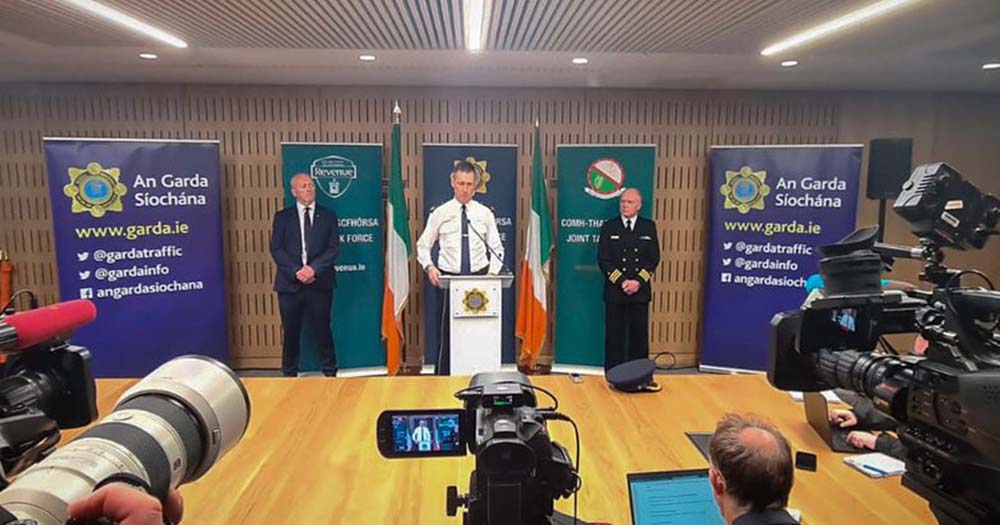The amount of hate-based crimes and hate-related incidents reported to Ireland’s An Garda Síochána increased by 12% in 2023 compared to 2022 according to official figures released today, May 8.
Garda shared that 548 hate crimes and 103 hate-related incidents were reported last year. Hate crimes are criminal incidents motivated by prejudice based on the victim’s perceived race, ethnicity, sexual orientation, gender identity, religion, age, disability and other characteristics.
Hate-related incidents occur when a person experiences a non-criminal incident of hostility or prejudice, and they are recorded to provide evidence of the prevalence of issues within local communities.
Garda previously published figures in 2021 and 2022. In 2023, 696 discriminatory motives were reported, compared to 617 in 2022 and 483 in 2021.
In 2022, hate crimes based on sexual orientation were the second highest percentage of discriminatory crimes reported, following race. This year, most of the incidents reported were linked to the victims’s ethnicity, with race being the most prevalent discriminatory motive (36%), followed by nationality (18%) and sexual orientation (16%). The largest proportion of hate-related incidents occurred in the Dublin Metropolitan Region (44%).
Today An Garda Síochána is launching our online hate crime reporting facility
If you wish to report a hate crime you can do via the following https://t.co/Xmknpa6VXo #LetsStopHateTogehter pic.twitter.com/jyjxiMSMG7
— Garda Info (@gardainfo) July 21, 2021
Chief Superintendent of Community Engagement Padraic Jones acknowledged that while the data is concerning, he is glad victims feel comfortable coming forward and speaking about these experiences.
Jones said: “Being targeted because of a characteristic has an enormous and often life-altering impact on a victim, and as a society we must continue to reject hate and discrimination. Everyone has a right to live safely.
He added: “I strongly encourage anyone that has experienced or observed prejudice to please come forward and report those incidents to us. I can assure you that we will deal with it professionally and provide our support in any way we can.”
Despite the increase in violence against LGBTQ+ people and other marginalised people, Ireland remains one of the few European countries that does not have an appropriate hate crime law in place.
Adam Long, Board Director of the National LGBT Federation acknowledged this and said: “Today’s figures, revealing a further rise in recorded hate offences, underline the clear need to enact the Hate Crime Bill without any further delay.
“That is the unequivocal message from The Coalition Against Hate Crime who represent the very communities impacted by hate and whose voices need to be heard above the noise and contrived ‘culture wars’. Behind the statistics are very real people who have been attacked, targeted and made feel unsafe simply because of who they are. By passing this legislation, we will be sending a message that Irish society will not tolerate such hate against LGBTQ+ people or other minority communities”
An Garda Síochána is working to strengthen its network of diversity officers to better support victims impacted by hate discrimination. In collaboration with the University of Limerick, Garda personnel have completed a certificate programme in human rights and policing in Ireland.
The Irish Council for Civil Liberties recently conducted a report to better understand racial discrimination in Ireland and found that many participants from ethnic minority communities described feeling unsupported, unprotected, and unrepresented by Gardaí.
View this post on Instagram
If you are in the position of needing to report a hate crime, it helps to know what to expect and what your rights are. Garda wants the public to know that no corroborating evidence is required to report an incident, and everyone is strongly encouraged to report hate-related crimes and incidents.
GCN recently spoke with Dee, who walked us through the process of reporting a hate crime based on their personal experience as a transgender person who was targeted in an incident. An online hate crime reporting tool is also available for anyone who needs to report an incident to the Gardaí without having to go into the station.
If you choose to report a hate crime to a Garda Station, you can request a specially trained Diversity Officer who can assist you through the process, and you are able to bring a friend with you for support.
© 2024 GCN (Gay Community News). All rights reserved.
Support GCN
GCN is a free, vital resource for Ireland’s LGBTQ+ community since 1988.
GCN is a trading name of National LGBT Federation CLG, a registered charity - Charity Number: 20034580.
GCN relies on the generous support of the community and allies to sustain the crucial work that we do. Producing GCN is costly, and, in an industry which has been hugely impacted by rising costs, we need your support to help sustain and grow this vital resource.
Supporting GCN for as little as €1.99 per month will help us continue our work as Ireland’s free, independent LGBTQ+ media.

comments. Please sign in to comment.